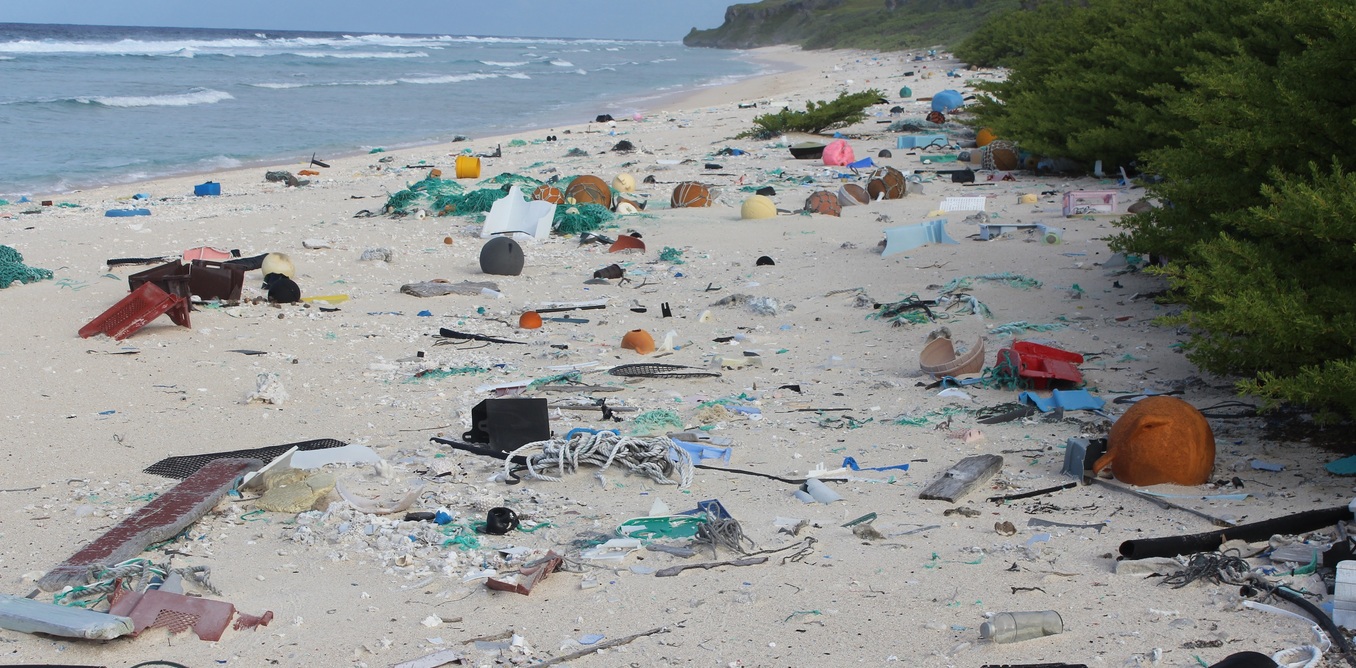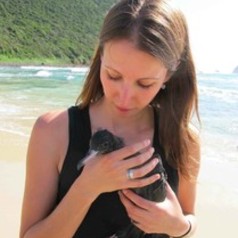A remote South Pacific island has the highest density of plastic debris reported anywhere on the planet, our new study has found.
Our study, published in the journal Proceedings of the National Academy of Sciences, estimated that more than 17 tonnes of plastic debris has washed up on Henderson Island, with more than 3,570 new pieces of litter arriving every day on one beach alone.
Our study probably actually underestimates the extent of plastic pollution on Henderson Island, as we were only able to sample pieces bigger than two millimetres down to a depth of 10 centimetres. We also could not sample along cliffs. Jennifer Lavers, Author provided
It is estimated that there are nearly 38 million pieces of plastic on the island, which is near the centre of the South Pacific Gyre ocean current.
Henderson Island, marked here by the red pin, is in the UK’s Pitcairn Islands territory and is more than 5,000 kilometres from the nearest major population centre. That shows plastic pollution ends up everywhere, even in the most remote parts of the world. Google Maps
A 2014 paper published in the journal PLOS One used data from surface water all over the world. The researchers estimated that there are 5.25 trillion pieces of plastic in the top 10 centimetres of the world’s oceans.
Plastics pose a major threat to seabirds and other animals, and most don’t ever break down – they just break up. Every piece of petrochemical-derived plastic ever made still exists on the planet.
The Henderson research program was funded through overseas agencies, primarily UK based philanthropy. A complete list is in the acknowledgements of the published paper here http://www.pnas.org/content/early/2017/05/09/1619818114.abstract. For the Henderson Island project, Jennifer Lavers is affiliated with the University of Tasmania, the Institute for Marine and Antarctic Studies and the RSPB Centre for Conservation Science, Royal Society for the Protection of Birds in the United Kingdom.



 Drug pollution in water is making salmon take more risks – new research
Drug pollution in water is making salmon take more risks – new research  Fungi are among the planet’s most important organisms — yet they continue to be overlooked in conservation strategies
Fungi are among the planet’s most important organisms — yet they continue to be overlooked in conservation strategies  Thousands of satellites are due to burn up in the atmosphere every year – damaging the ozone layer and changing the climate
Thousands of satellites are due to burn up in the atmosphere every year – damaging the ozone layer and changing the climate  Lake beds are rich environmental records — studying them reveals much about a place’s history
Lake beds are rich environmental records — studying them reveals much about a place’s history  As the Black Summer megafires neared, people rallied to save wildlife and domestic animals. But it came at a real cost
As the Black Summer megafires neared, people rallied to save wildlife and domestic animals. But it came at a real cost  Fertile land for growing vegetables is at risk — but a scientific discovery could turn the tide
Fertile land for growing vegetables is at risk — but a scientific discovery could turn the tide  An unexpected anomaly was found in the Pacific Ocean – and it could be a global time marker
An unexpected anomaly was found in the Pacific Ocean – and it could be a global time marker  Wildfires ignite infection risks, by weakening the body’s immune defences and spreading bugs in smoke
Wildfires ignite infection risks, by weakening the body’s immune defences and spreading bugs in smoke  GesiaPlatform Launches Carbon-Neutral Lifestyle App ‘Net Zero Heroes’
GesiaPlatform Launches Carbon-Neutral Lifestyle App ‘Net Zero Heroes’  Parasites are ecological dark matter – and they need protecting
Parasites are ecological dark matter – and they need protecting  Swimming in the sweet spot: how marine animals save energy on long journeys
Swimming in the sweet spot: how marine animals save energy on long journeys 


































